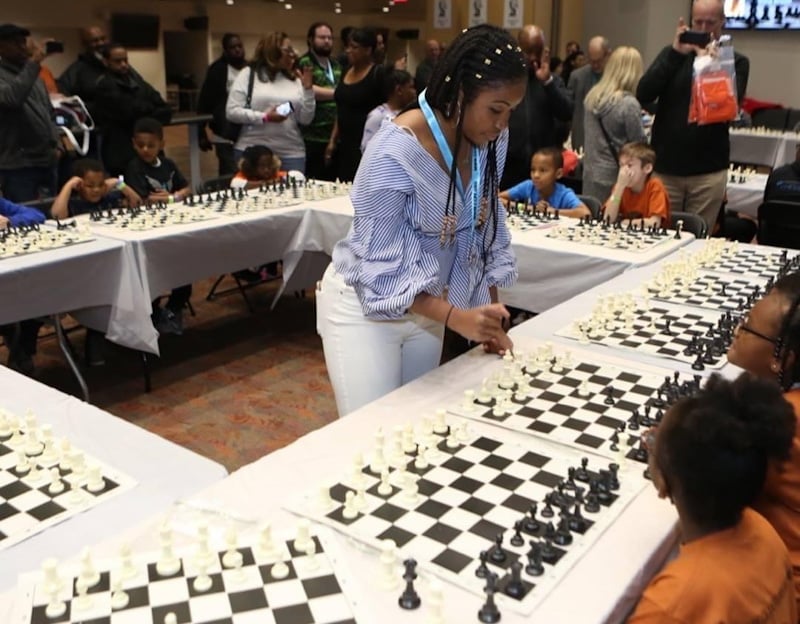Checkmate: BigLaw associate seeks chess master status

Rochelle Ballantyne, 28, a Sidley Austin litigation associate, at the 2018 Queen City Classic Chess Tournament. Ranked as an expert chess player, she attended the Cincinnati event to meet students and provide game commentary. Photo by Jeremy McDaniel.
Opposing counsel may want to watch out for Rochelle Ballantyne, a first-year litigation associate at Sidley Austin and a longtime chess champ with a fierce competitive spirit.
“Chess is a combative sport, and so is litigation,” Ballantyne says. “There’s a winner and a loser, and I like to win.”
Since she was a child, Ballantyne competed in chess tournaments throughout the country, and on a few occasions, she competed abroad—learning skills that she says help her in her legal career.
“In chess, you have to have the ability to think steps ahead of your opponent,” Ballantyne says. “As a litigator, you are not just thinking about the opposing argument but the arguments and responses that come after that. You have to be able to anticipate what’s going to happen far ahead.”
In addition to her work at Sidley Austin, Ballantyne, 28, is intent on becoming the first Black female chess master, a title awarded by the U.S. Chess Federation to the top ranking players. She’s currently ranked an expert, a level below master. To become a master, Ballantyne must achieve a ranking of 2,200 or better, a number based on the amount and the type of games in which she has competed and won.
According to the U.S. Chess Federation website, 14% of its membership is female.
“My achieving this goal would I hope show Black girls that someone who looks likes like them can achieve in male-dominated sports like chess,” says Ballantyne, who is on the board of directors of the Gift of Chess. The organization focuses on donating 1 million chess sets globally by 2030 to make the game accessible and affordable worldwide.
“I’m proud to be part of this organization because I know how much chess has meant to me, and I want to share that with more people that look like me and come from my background,” Ballantyne says.
She grew up in the Crown Heights section of the New York City borough of Brooklyn, raised by a single mother. She has three younger siblings, and the family struggled financially. Her grandmother taught her to play chess when Ballantyne was around 8 or 9 years old.
“I was apparently a very rambunctious child, and she thought teaching me chess would be a good way to get me to calm down,” Ballantyne says.
She adds that chess still helps her “recenter and reground” herself.
Ballantyne started participating in chess competitions in elementary school.
“I enjoyed winning, and I just kept winning. It was a lot of fun,” says Ballantyne, who claims that the game shaped who she is today. “It required discipline. It allowed me to travel and meet all kinds of people.”
At times, Ballantyne says, she was the only Black girl in the room playing chess.
That “taught me how to speak up for myself and lead with confidence,” she adds. “I know how to make sure that my identity isn’t drowned out.”
Ballantyne was featured in Brooklyn Castle, a 2012 documentary exploring the chess program at Intermediate School 318, a public school that Ballantyne attended, which serves mostly minority students from families living below the poverty line.
“My junior high school team was really good, one of the best in the nation,” says Ballantyne, who attributes in part her academic success to the experiences that she had playing chess.
After graduating from Stanford University in 2017 with a double major in political science and African American studies, she moved from California back to New York, and she got a master’s degree in education policy from Columbia University’s Teachers College.
Ballantyne says she has wanted to be a lawyer since she was young, so she attended the New York University School of Law, graduating in 2023.
Interviewed via Zoom, Ballantyne recently moved into her New York office at Sidley Austin. Previously, she had a Sidley Austin pro bono fellowship, working for the New York Legal Assistance Group in its special education unit.
Working at Sidley Austin, Ballantyne says, feels like the “natural route to take next,” although she recognizes that she might not have as much time as she would like to play chess as a first-year associate. Nevertheless, she is still focused on making chess master because, in part, she sees herself as a role model for Black girls.
“Girls shouldn’t have to think about the nuances of identity as they sit down at a board,” Ballantyne says. “I don’t know how to solve that problem, but I guess me showing up is important.”



